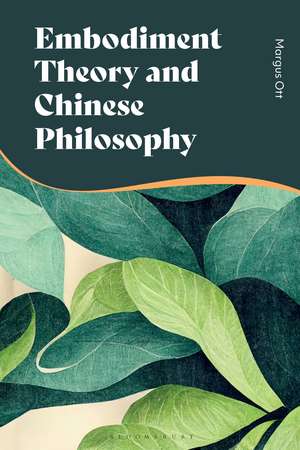Embodiment Theory and Chinese Philosophy: Contextualization and Decontextualization of Thought
Autor Margus Otten Limba Engleză Hardback – 21 aug 2024
Preț: 510.34 lei
Preț vechi: 731.17 lei
-30% Nou
Puncte Express: 766
Preț estimativ în valută:
97.68€ • 106.14$ • 82.11£
97.68€ • 106.14$ • 82.11£
Carte disponibilă
Livrare economică 31 martie-14 aprilie
Livrare express 15-21 martie pentru 119.24 lei
Preluare comenzi: 021 569.72.76
Specificații
ISBN-13: 9781350424142
ISBN-10: 1350424145
Pagini: 256
Ilustrații: 10 bw illus
Dimensiuni: 156 x 234 x 21 mm
Greutate: 0.5 kg
Editura: Bloomsbury Publishing
Colecția Bloomsbury Academic
Locul publicării:London, United Kingdom
ISBN-10: 1350424145
Pagini: 256
Ilustrații: 10 bw illus
Dimensiuni: 156 x 234 x 21 mm
Greutate: 0.5 kg
Editura: Bloomsbury Publishing
Colecția Bloomsbury Academic
Locul publicării:London, United Kingdom
Caracteristici
Presents two cases of embodiment-based philosophy (the Zhuangzi and the Treatise on Music) that show the philosophical potential of embodiment theory
Notă biografică
Margus Ott is a researcher at Tallinn University, Estonia. He has performed previous research in Taiwan and Xiamen with the National Taiwan University.
Cuprins
Acknowledgments1. Introduction1.1. Contextualizing and Decontextualizing Thought1.2. Roots of Embodiment Theory (ET)1.3. Chinese Traditions and ET1.4. Content Summary2. Embodiment 2.1. Tenets of Disembodiment2.2. Embodiment2.3. Embeddedness2.4. Enactment2.5. Extendedness2.6. Affectivity2.7. Emergence2.8. Self-relation2.9. Other-relation2.10. Implicitness2.11. Guidance by Example2.12. Singularities and Intensities 2.13. Embodied Disembodiment2.14. Meaning of Disembodiment2.15. Conclusion 3. Background3.1.Greek Socio-political Background3.2.Chinese Socio-political Background3.3. Ritual Background3.4. Rituals as Contextualizing3.5. Kurankos3.6. Hasidic Traditions3.7. Ritual Knowledge3.8. Conclusion 4. Embodied Foundations: Confucius ??4.1. Embodied4.2. Singular and Ordinary4.3. Embedded4.4. Flexibility4.5. Enacted4.6. Extended4.7. Other-relation4.8. Emotive4.9. Implicitness4.10. Emergence4.11. Ease and Joy4.12. Self-cultivation4.13. Conclusion 5. Mohist Disembodied Reaction: Mozi5.1. Introduction5.2. Disembodied Standards5.3. Extension of Subjectivity: All-inclusive Care5.4. Meritocracy5.5. Explicitness5.6. Conclusion 6. Legalist Disembodied Reaction: Han Feizi 6.1. Introduction6.2. Laws6.3. General and Explicit6.4. Generality of Basic Preferences: Third-person View6.5. Staying "cool"6.6.New, Decontextualized Civic Morality6.7. Objectivity, Quantity6.8. Conclusion 7. A Confucian Development of Embodiment: Record of Music (Yueji)7.1. Mencius7.2. Xunzi7.3. Record of Music7.4. Emotions7.5. Return to One's Body: Individual Transformation of Emotions7.6.Social Embeddedness: Collective Transformation of Emotions7.7.Ontology of Energy and Veins7.8.Self-cultivation According to Energy and Veins7.9.Enacted Knowledge7.10. Music and Rituals: integration and differentiation7.11. Free Space7.12. Simplicity and Ease7.13. Cosmic Purport7.14. Conclusion 8. A Daoist Development of Embodiment: Zhuangzi 8.1. Introduction8.2. A "knack"8.3. Stages of Practice8.4. Danger of Mechanical Mind in Extended Cognition8.5. Other-relation8.6. Transformation8.7. Sitting and Forgetting8.8. Free Roaming8.9. Knowing with Non-knowing8.10. Zhuangzian Ideas as Reflection on a Skill8.11. Zhuangzi and Decontextualization8.12. Conclusion 9. ConclusionNotesReferencesIndex
Recenzii
Margus Ott critically examines traditional Western epistemologies, noting their abstract, decontextualizing nature, and contrasts them with Chinese philosophy. He explores how knowledge intertwines with embodied context, revealing how transcending physical forms can lead to an integrated understanding of body and mind, offering alternative ways of experiencing and being in the world.
